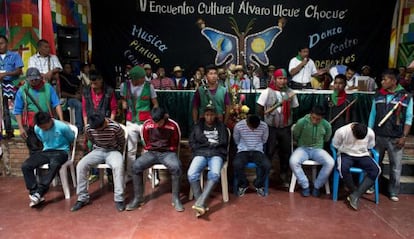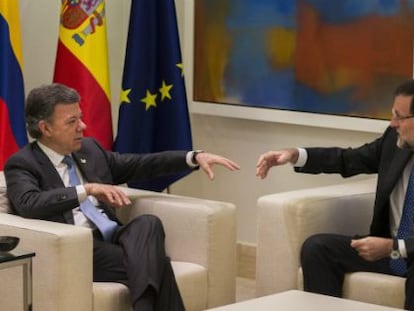FARC members receive indigenous justice in Colombia
Tribe sentences five rebels to between 40 and 60 years in jail for killing two of their leaders

The indigenous Nasa people of Toribío in the north of Cauca province (southwest Colombia) only took four days to decide the fate of seven rebel soldiers from the Revolutionary Armed Forces of Colombia (FARC) accused of killing two tribal leaders on November 5. The jury’s verdict concerning the deaths of 42-year-old Manuel Tumiñá and 63-year-old Daniel Coicué came after a six-hour debate attended by thousands of indigenous people. The tribe applies its own law based on its right to autonomy, which is enshrined in the Colombian Constitution.
The victims were shot because they tried to keep rebels from hanging banners honoring a FARC leader on their territory.
It did not matter that those accused of the double-homicide were also indigenous. They were arrested by the Indigenous Guards of Cauca. The tribe ruled that the defendant known as Fercho was the one who shot his fellow tribesmen and sentenced him to 60 years in prison.
The tribe applies its own law based on its right to autonomy, which is enshrined in the Constitution
The trial is held like an assembly. When asked how long the guilty man should remain in prison, the crowd yelled “40 ... 50 ... 60.” In the end, the length of the sentence was decided by a show of hands. Meanwhile, relatives of the accused shouted, asking them not to be so harsh. “I prefer to respond to the organization [the FARC] to which I belong and not to another authority,” the defendant told the community, which has been one of those most affected by the armed conflict. Four other rebel soldiers were sentenced to 40 years and two more, a 14-year-old and a 17-year-old, were sentenced to 20 lashes each. The minors will be sent to a juvenile rehabilitation center.
These murders and subsequent sentencing of the rebels come at an important moment in the course of the two-year peace negotiations between the FARC and President Juan Manuel Santos’ administration. The talks are focusing on how to make reparations to nearly seven million victims of the conflict. After repeated denials, the rebels recently acknowledged the harm they did to civilians. But they qualified their comments by saying the damage was the result of “involuntary errors,” given that civilian communities were not the main target. They also denied committing crimes against humanity.
The administration’s negotiators and the United Nations have condemned the murders of Tumiñá and Coicué. The men belonged to the Indigenous Guard of Cauca, an organization that has peacefully resisted the damage that the rebel army, criminal organizations and the national army have wreaked on its territory, thus exercising a kind of sovereignty. Its only defense is dialogue and wooden batons.
These murders and subsequent trial come at an important moment in the peace negotiations
“It’s unacceptable that while we move forward in the talks to end the conflict in Colombia, the FARC continues to attack the civilian population in this way,” says the government’s delegation in Havana. The UN has urged the rebels to respect the collective rights of indigenous peoples.
In a statement, the FARC expressed “sorrow and concern” over the death of the two indigenous leaders, but did not condemn its soldiers’ actions. They only said what happened did not deserve “such exacerbation.” However, they did deny authoring a pamphlet that began circulating after the double homicide had taken place that listed 26 Nasa leaders as “military objectives” – an incident that worsened the crisis in Cauca and provoked strong indignation from the ombudsman and the government itself. Both called on the FARC to issue an immediate statement.
A large march bid a last goodbye to the two fallen indigenous guards. One of the priests at the event, who has been quoted in the local media, insisted that no armed individual would get them off their land. “The Indigenous Guard will always be on top, strong, in spite of adversity.” Others shouted: “United, they will not defeat us. No war, no weapons, no gunshots will defeat us!”
Translation: Dyane Jean François








































